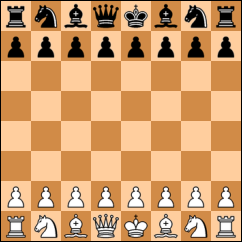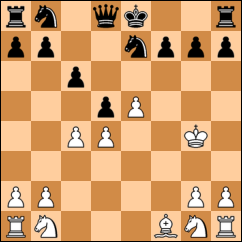It's with this in mind that I sat down a few months ago and designed two modest chess variants that I was fortunate enough to be able to subject a couple of friends to at the second of our occasional chess variant tournaments earlier this year. I've designed chess variants before, but these were actually playable and actually interesting, belonging to the family of chess variants distinguished by pieces inheriting their powers from others, one of the simplest and most common types of variants. They're not better games than chess, if such a thing could even be imagined, but I feel that they're interesting while still being very familiar to the chess player, and they certainly seem to have some replay value, at least amongst amateur players such as ourselves.
The first of these games, which am identical starting position to Orthochess, is a little something that I call Chatarangaraja, which I, in my utter ignorance of foreign languages, believe might translate to something like 'The Game of the Quadripartite King'. This is a play on the name of the postulated first ancestor of chess (depending which school of thought you belong to). The rules are the same as those of orthochess except that:
A) The King has no movement powers of his own, but instead gains the powers of all the pieces remaining in his army except the Queen.
B) There's no castling, as the increased powers of the King makes it unneeded.
In the beginning of the game, the King has the movements of a Rook, Bishop, Knight and Pawn, becoming an incredibly powerful offensive piece (an Amazon, in fairy parlance), but loses power as his pieces are taken. In the example below, though the white King may appear to be exposed and is down a Queen, White retains the full movement of the King while the Black King has lost his bishops and no longer has his diagonal movement (except for one square while capturing, like a pawn). A queen sacrifice for a minor piece in order to use a more powerful King more effectively to check the opponent is a common tactic in this game, as the other pieces have a value greater than their orthochess counterparts.
The game is easy to pick up and play passably well, but many learnt chess positions and strategies no longer apply. The powerful King means that an all out blitz straight away is almost certain to fail, and the King moving as a knight has been a trap for many an invading force. But as is typical for games with strong pieces, the game is typically over faster than orthochess, and the play seems to shift more easily too.
Perhaps more properly this game should be called Chaturangaking, with the -raja version being reserved for the same concept in a game of Shatrang, rather than modern chess. But hey, I like the name better like this, and due to the glacial pace of Shatrang and its variants I'm unlikely to play it anytime soon, so we'll call that version Chaturangashah and be done with it.
That's it for today, except to say that I'd recommend this game to those of you that like chess and would welcome any comments that you'd care to make on it, and any games of it you'd care to play against me if you happen to live nearby or can devise a way to play it online. I had intended to leave you with a puzzles that I've devised to demonstrate the game and give you some concept of the ideas of this little variant, but I've made a fundamental error that I can't think how to solve this early in the morning, so that will have to be a post for another day.
Keep on Chooglin'


1 comment:
That's pretty awesome. I play regular chess so badly, though, that variants pretty much just make my head explode.
Post a Comment